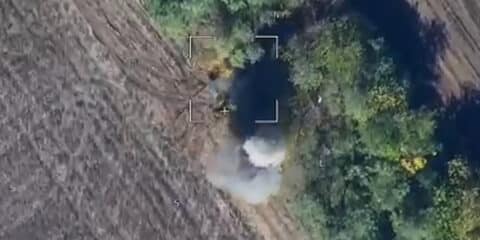Trends and likely developments over the coming year in Israel’s strategic environment, alongside possible “twists” – unexpected events of concern.
By fellows of the Jerusalem Institute for Strategy and Security, December 2019
jiss-forecast-2020-english-december-2019
This document surveys trends and likely developments over the coming year in Israel’s strategic environment. It also reviews possible “twists” – unexpected events of concern.
Among the many unknowns, the political uncertainty that currently characterizes Israeli politics could impact on the country’s ability to respond to challenges and take advantage of opportunities.
Part One: Trends and their Implications for Israel
1.1 Iran
![]() Iran will continue to strip the JCPOA of any content, and will escalate its enrichment of uranium, perhaps even dramatically so.
Iran will continue to strip the JCPOA of any content, and will escalate its enrichment of uranium, perhaps even dramatically so.
Washington’s campaign of “maximum pressure” (economic sanctions) on Iran will continue to drain Iran’s economy, posing significant challenges to the Ayatollahs. As long as Khameini refuses to start negotiations with America, we can expect continued Iranian provocations in the Gulf and elsewhere in response to these pressures, including an intensification of brazen IRGC and Qods force operations. Clashes between Iran and Israel in Syria could escalate into broader conflict.
On the other hand, Tehran could agree in the latter half of 2020 to talks with the US on the nuclear accord and other matters, if Iran faces extreme economic peril and political crisis or if a Trump re-election victory seems assured.
In any case, the regime will continue to brutally suppress all domestic protests. (The current unrest in Iran seems to be the most significant challenge to the regime since the protests of 2009, and perhaps since the revolution in 1979).
In the run-up to parliamentary elections in February, political jockeying will intensify, but “reformist” politicians are in retreat. Khameini has signaled that he sees Chief Justice Ebrahim Raisi as his deputy, and given Khameini’s poor health, Raisi could become Supreme Leader in 2020 too.
Implications for Israel: High probability of more Iranian aggression, and even broader conflict with Israel if, in the latter half of 2020, Iran ramps-up uranium enrichment. Israel must be ready to tackle Iran on its own. Simultaneously, Israel must be prepared for the problematic possibility of renewed US-Iran talks, and work to ensure full coordination with Washington regarding the demands to be made of Iran.
1.2 Syria and Lebanon
 President Assad is on his way to re-establishing central regime control. The departure of American forces from Syria will continue because of US electoral considerations and more, making room for a Syrian-Kurdish condominium. Syria-Tukey tensions will persist, despite Russian mediation. The Syrian military offensive in Idlib will advance. Syria is likely to return to the Arab League, and Europe will engage Syria in dialogue on issues of refugees and terrorism. The US will nevertheless continue to pressure Syria economically, leaving Assad dependent on Iran.
President Assad is on his way to re-establishing central regime control. The departure of American forces from Syria will continue because of US electoral considerations and more, making room for a Syrian-Kurdish condominium. Syria-Tukey tensions will persist, despite Russian mediation. The Syrian military offensive in Idlib will advance. Syria is likely to return to the Arab League, and Europe will engage Syria in dialogue on issues of refugees and terrorism. The US will nevertheless continue to pressure Syria economically, leaving Assad dependent on Iran.
Internal conflict in Lebanon will intensify, with Hizballah holding the upper hand and holding the country hostage even if elections are held. Economic difficulties will only strengthen Hizballah, as members of other groups emigrate.
Implications for Israel: Israel must be ready for escalation, including pre-emptive warfare with Hizballah. There may be opportunities for Israel, if Syria stabilizes and becomes less dependent on Iran; if Russia acts to rein-in the Iranians; and if Hizballah is distracted and constrained by internal Lebanese unrest.
1.3 Russian Role
![]() President Putin’s rule is structurally weak for the long term because of low energy prices in the global market and Western economic sanctions, although there is some weakening of European sanctions against Russia. Russia will continue to counter America on the global diplomatic stage. Putin assumes that President Trump will nevertheless avoid any military confrontations with Moscow.
President Putin’s rule is structurally weak for the long term because of low energy prices in the global market and Western economic sanctions, although there is some weakening of European sanctions against Russia. Russia will continue to counter America on the global diplomatic stage. Putin assumes that President Trump will nevertheless avoid any military confrontations with Moscow.
Russia will continue to deepen its involvement in the Middle East through arms sales and diplomatic-military interventions, although nothing on the scale of its involvement in Syria.
Israel cannot meet the expectation of the Russian defense establishment that Jerusalem will pave the way towards a gentler American approach to Moscow. It is not at all certain that Russia will continue to allow Israel unimpeded domination of Syrian airspace (for action against Iranian targets), and the IDF must have operational plans for maneuvering in girdled circumstances.
Implications for Israel: In order to maintain freedom of operation in Syria for the IDF, Israel must continue to dialogue with Russia (and Putin), while seeking ways of compensating Russia on the American front.
1.4 Turkey
![]() Turkey’s economy is fragile. Elections are not expected before 2023. Erdogan is dependent on a coalition with the nationalist MHP party, and this dictates continued assault on the Kurds (unless Washington intervenes forcefully to block this).
Turkey’s economy is fragile. Elections are not expected before 2023. Erdogan is dependent on a coalition with the nationalist MHP party, and this dictates continued assault on the Kurds (unless Washington intervenes forcefully to block this).
Turkey will push a significant number of Syrian (Sunni) refugees into the zone of Syria occupied by Turkish troops. Indeed, Turkey can be expected to increase its military interventions across the Mideast including Libya. The Turks may act against Cypriot sovereignty (in its economic waters), and against Greece. Nevertheless, the Turks may delay introduction of the Russian S-400 anti-missile system in order to placate Washington.
Implications for Israel: Turkey’s basic hostility towards Israel, and its nefarious meddling in eastern Jerusalem, will continue, even though confronting Israel isn’t Ankara’s top priority. Israel should push back by strengthening its ties to Cyprus and Greece, without forcing full-scale confrontation with Turkey.
1.5 Regional Affairs
![]() Unrest in Iraq and Lebanon will continue at varying degrees of intensity (including the anti-Iranian overtones), as will the civil wars in Libya and Yemen.
Unrest in Iraq and Lebanon will continue at varying degrees of intensity (including the anti-Iranian overtones), as will the civil wars in Libya and Yemen.
Despite civil unrest and protests, and escalating conflict with Ethiopia over water resources, the Egyptian regime remains stable. Sisi’s battle against ISIS in Sinai is advancing, as well.
Diplomatic tensions between Jordan and Israel may increase (regarding Jerusalem, the Jordan Valley and canal projects), although the security relationship between the two countries will remain strong.
Delicate and slow progress in ties between the Gulf states and Israel is expected, including possible rapprochement between Qatar and Israel. On the other hand, if Iran’s hegemonic advances are not checked, some Gulf starts may instead seek to bandwagon with Iran.
Implications for Israel: Maintaining the peace with Egypt and Jordan and ensuring the stability of these countries are top priorities for Israel. Relations with the Gulf countries must be handled discreetly and carefully. Israel should also be open to approaches from other Arab countries that fear Iran.
1.6 Jerusalem
![]() Two contradictory trends in eastern Jerusalem will continue. On the one hand, eastern Jerusalemite Arabs are better integrating into the city (through increased educational, employment, health and other opportunities), entrenching Israel’s sovereign control. On the other hand, radical nationalist and Islamic actors including Turkey have increased their interventions in the city.
Two contradictory trends in eastern Jerusalem will continue. On the one hand, eastern Jerusalemite Arabs are better integrating into the city (through increased educational, employment, health and other opportunities), entrenching Israel’s sovereign control. On the other hand, radical nationalist and Islamic actors including Turkey have increased their interventions in the city.
The muted Arab world reactions to the move of the US embassy to Jerusalem may encourage other countries to move their embassies to Jerusalem too.
Implications for Israel: Israel’s long-term goal of securing a united and prosperous Jerusalem and gaining international recognition of such will be enhanced by additional Israeli investment in all parts of the city. This will draw more Israelis to the city (“Zionist settlement”) and advance the integration of Jerusalemite Arabs while checking hostile actors.
1.7 Palestinians
![]() The political jockeying around Mahmoud Abbas will escalate as he clings to power, raising questions about the future of the Palestinian Authority (PA). The likelihood for a Fatah-Hamas understanding that would allow for Palestinian internal elections – is low.
The political jockeying around Mahmoud Abbas will escalate as he clings to power, raising questions about the future of the Palestinian Authority (PA). The likelihood for a Fatah-Hamas understanding that would allow for Palestinian internal elections – is low.
Cooperation between Palestinian and Israeli security forces will continue. But the PA will fiercely oppose the Trump peace initiative (across all issues: Jerusalem, settlements, security, sovereignty) and any unilateral Israeli moves (such as annexation of the Jordan Valley). However, Palestinian disgruntlement will be mainly channeled into international diplomatic moves against Israel, not to violent unrest – unless the economic situation in the territories worsens.
IDF power and the difficult economic situation will continue to wear down Hamas, as that organization moves toward medium-term “understandings” with Israel. However, the Iranian-backed Palestinian Islamic Jihad will try to continue to derail such understandings.
Implications for Israel: Conflict management should remain the basic construct for Israel’s relations with the Palestinians. Israel must respond positively the Trump plan so that the onus of its failure (alas) falls on the PA. Israeli intelligence must prepare for all scenarios relating to a PA succession crisis. In Gaza, Israel must be prepared both for tougher-than-ever military action to deter Hamas and for more-generous-than-ever economic arrangements that might secure calm with Hamas.
1.8 International Arena
![]() 1.8.1 United States
1.8.1 United States
Trade tensions with China will continue to dominate the US election campaign. But the fierce partisan atmosphere of the 2020 elections also threatens to undermine the long-standing Democratic-Republican consensus of support for Israel, a development which also complicates Israel’s relations with American Jewry.
Washington will expect support for the Trump peace plan (if and when it is presented), from Israel – even it involves some painful concessions on Israel’s part, and from Arab states – even if it involves diplomatic gains for Israel.
Implications for Israel: Israel has no choice but to respond “yes, but” to the Trump plan, and Jerusalem should do everything possible to maintain and rebuild a bipartisan American political consensus regarding Israel. Israel must push back against those who seek to introduce political “conditionality” to US military aid to Israel and explain that, as the US withdraws from the Mideast, Israel’s strategic importance to the US increases (as well as its freedom of action).
1.8.2 Europe
The known trends in European relations with Israel will continue: Criticism of Israel regarding Palestinian affairs (including the latest European effort to label settlement products), alongside bilateral trade and scientific cooperation, including negotiations over the next “Horizon” agreement. Europe’s weak military posture will not change, nor will its forgiving approach to the Iranians. The EU is largely possessed by its internal problems, and unable to craft a unitary foreign policy.
Implications for Israel: to offset pressures from Brussels, Israel should continue to develop its ties to eastern European and eastern Mediterranean countries.
1.8.3 China
Hostility to China will escalate as the US election campaign advances. The dispute regarding Huawei and internet infrastructure is a test case, that will also be applied regarding Israel.
The Mediterranean is an important part of China’s BRI, bringing China into play as a major infrastructure player in many countries, including Israel and Greece. China’s pro-Palestinian political line will continue, but without substance.
Implications for Israel: While Israel’s burgeoning trade and economic relations with China are important, sensitivity to American concerns are paramount. Jerusalem must therefore carefully screen all Chinese investments in Israel and Israeli exports to China, while encouraging Chinese investments in the region where such can be most helpful, such as in Egypt.
1.8.4 India
Prime Minister Modi’s strong relationship with Israel will continue, especially as India faces escalated tensions with Pakistan and regarding Kashmir. But India has its own set of interests regarding Iran, which are not completely in synch with Israel’s.
Implications for Israel: Israel’s ties to India are of paramount importance (including military industry ties), as are Israeli ties to Asian countries like Australia, Japan, Korea, Philippines, Singapore and Vietnam. Israel should seek ways of enhancing Gulf state ties with India so that India can comfortably retract its relationship with Iran.
Part Two: Unexpected Twists
2.1 Deterioration into war between Iran and the Gulf states, which could engulf the entire region including Israel.
2.2 A move the opposite direction: Saudi Arabia and the UAE move to reduce tensions and bandwagon with Iran, leaving Israel alone to confront Tehran.
2.3 Russia moves to actively oppose Israel’s freedom of action against Iranian targets in Syria.
2.4 Washington moves to cut a new nuclear deal with Tehran, abandoning many demands of Iran that are important for Israel.
2.5 Khameini dies, followed by a succession struggle in Iran, leading to more civil protests and a decline in Iranian support to its revolutionary proxies across the region, including Hezbollah.
2.6 Israel-Jordan ties take a dive, as Amman draws closer to Turkey and Qatar and away from the US, to the point where Jordan suspends its energy deal with Israel or even its peace treaty with Israel.
2.7 The Hashemite monarchy loses control of power in Jordan.
2.8 Cracks develop in Egyptian leadership alongside angry dissent in the streets against the regime, bringing back the Moslem Brotherhood.
2.9 Civil war in the West Bank following the death or resignation of Mahmoud Abbas, leading to Hamas takeover.
2.10 Israeli attempts to reach long-term “understandings” with Hamas fail, leading Hamas to spark a major confrontation with Israel in order to wrest an end to Israel’s “siege” (as Hamas terms it) on Gaza.
2.11 Turkey and/or Egypt join the race for nuclear weapons.
2.12 Rise of the radical left in American politics, including an initiative to cut military aid to Israel.
2.13 A “successful” major terrorist attack in the US or Europe by ISIS or other Islamic groups, which shifts the global political dynamic and brings about renewed Western intervention in the Mideast.
2.14 Near-nuclear conflict elsewhere in the world, like Kashmir or Korea, which will force non-proliferation to forefront of diplomatic discourse, with all that this entails for Israel.
Implications for Israel: With considerable regional and global uncertainty defining Israel’s strategic environment, Israel must ensure that it possess national cohesion with which to face the challenges ahead. Israel also must improve its military preparedness, especially the readiness of its ground forces for decisive maneuver in enemy territory. Israel must strengthen its primary diplomatic alliances, especially its alliance with the US, to ensure maximum strategic flexibility against enemies and to capitalize on key diplomatic opportunities.
The Jerusalem Institute for Strategy and Security
Established in 2017, the Jerusalem Institute for Strategy and Security (JISS) offers security expertise for a strong Israel. The institute considers the Jewish People’s historic connection to the Land of Israel a central component of strategic worldview; and highlights the importance of united Jerusalem to Israel’s destiny and defense. It provides counsel to the highest echelons of Israeli government and trains the next generation of Israeli national security specialists.
Prof. Efraim Inbar, President
Maj. Gen. (res.) Yaakov Amidror, Anne and Greg Rosshandler Senior Fellow
Col. (res.) Dr. Eran Lerman, Vice President
Mr. David M. Weinberg, Vice President
Mrs. Micky Aharonson
Mr. Lazar Berman
Dr. Oshrit Birvadker
Dr. Hay Eytan Cohen Yanarocak
Mr. Omer Dostri
Dr. Yagil Henkin
Dr. David Koren
Dr. Joshua Krasna
Dr. Udi Levi
Dr. Yossi Mansharof
Dr. Aiman Mansour
Dr. Emmanuel Navon
Mr. Alexander B. Pevzner
Dr. Uzi Rubin
Dr. Jonathan Spyer
11 Duvnov Street, Jerusalem 9223006 Israel
facebook.com/JissDigital | twitter.com/JISS_Israel | www.jiss.org.il
photo: Bigstock








 - בניית אתרים
- בניית אתרים